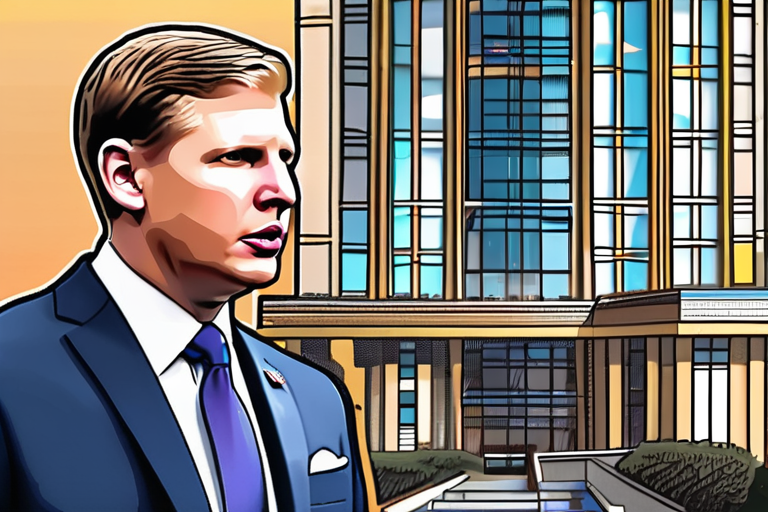The Trump Touch: Eric Trump's Bold Plan to Tokenize Real Estate
In a move that could revolutionize the way we invest in property, Eric Trump, son of former U.S. President Donald Trump and co-founder of decentralized finance protocol World Liberty Financial (WLFI), has confirmed plans to tokenize a new real estate project. This innovative initiative, which involves partnering with WLFI's stablecoin USD1, aims to democratize access to property ownership by allowing public micro-investments and perks tied to property ownership.
As we delve into the world of tokenization, it becomes clear that this is not just another cryptocurrency venture. Eric Trump's vision for a more inclusive and transparent real estate market has the potential to disrupt traditional investment models and create new opportunities for investors worldwide.
A New Era in Real Estate Investing
The concept of tokenization is not new, but its application in the real estate sector is still in its infancy. By converting physical assets into digital tokens, property owners can raise funds without relying on banks or traditional financial institutions. This approach offers several benefits, including increased liquidity, reduced costs, and enhanced transparency.
Eric Trump's project, which is tied to a building currently under development, promises to take tokenization to the next level. "We are working on it as it pertains to one specific building that I'm doing right now," he revealed in an interview with CoinDesk TV. The initiative has the potential to offer fractional ownership to the public, allowing individuals to invest in property without having to purchase a whole unit.
A Market in Flux
The real estate market is always subject to fluctuations, but the rise of tokenization and decentralized finance (DeFi) protocols like WLFI's USD1 stablecoin has created a new dynamic. As investors become increasingly comfortable with digital assets, the demand for tokenized property investments is likely to grow.
Market analysts predict that this trend will continue, with some projecting a significant increase in tokenized real estate deals over the next year. "The intersection of blockchain and real estate is an exciting space," says Sarah Jones, a market analyst at research firm Deloitte. "As more projects emerge, we can expect to see increased adoption and innovation in this area."
Practical Implications
So what does this mean for investors and property owners? For one, it offers a new way to raise funds without relying on traditional financial institutions. Tokenization also enables fractional ownership, making it possible for individuals to invest in property without having to purchase a whole unit.
However, there are also challenges to consider. Regulatory frameworks for tokenized real estate investments are still evolving, and investors must be aware of the potential risks associated with this new asset class.
A Family Affair
Eric Trump's involvement in this project is not surprising, given his family's history in real estate development. As a co-founder of WLFI, he has been at the forefront of DeFi innovation, working to create more accessible and transparent financial systems.
When asked about his motivations for tokenizing real estate, Eric Trump emphasized the potential benefits for investors and property owners alike. "We're not just talking about creating a new investment opportunity," he said. "We're talking about democratizing access to property ownership and creating a more inclusive market."
Conclusion
Eric Trump's bold plan to tokenize real estate has the potential to revolutionize the way we invest in property. By partnering with WLFI's USD1 stablecoin, this initiative offers a new way to raise funds and create fractional ownership opportunities.
As the world of tokenization continues to evolve, it will be interesting to see how this project unfolds. With its potential to democratize access to property ownership and create more inclusive investment opportunities, Eric Trump's vision for real estate tokenization is one that bears watching.
About the Author
Krisztian Sandor is a finance journalist with over 10 years of experience covering the intersection of technology and finance. He has written extensively on topics related to decentralized finance (DeFi), blockchain, and cryptocurrency.
*Based on reporting by Coindesk.*



 Hoppi
Hoppi

 Hoppi
Hoppi

 Hoppi
Hoppi

 Hoppi
Hoppi

 Hoppi
Hoppi

 Hoppi
Hoppi











